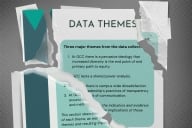You have /5 articles left.
Sign up for a free account or log in.
Testing firms are offering new ways to measure what students learn in college. Their next generation of assessments is billed as an add-on – rather than a replacement – to the college degree. But the tests also give graduates something besides a transcript to send to a potential employer.
As a result, skills assessments are related to potential higher education “disruptions” like competency-based education or even digital badging. They offer portable ways for students to show what they know and what they can do. And in this case, they’re verified by testing giants.
“This is how competencies could become the currency of the land instead of the credit hour,” said Michelle Rhee-Weise, a senior research fellow at the Clayton Christensen Institute for Disruptive Innovation, a think tank with a focus on education and health care.
The latest arrival of the bunch will be a revised version of the Collegiate Learning Assessment, dubbed the CLA+, which the Council for Aid to Education is rolling out this fall. The new test, which is the CLA's first upgrade in a decade, includes a work readiness component and more student-level data.
Earlier this year the Educational Testing Service (ETS) introduced two new electronic certificates for student learning. And ACT Inc. continues to develop its WorkKeys skills assessment system.
Officials from the three nonprofit testing firms said they are responding to the accountability push in higher education, which seeks better, more detailed measures of student learning than college grading alone. That means the new assessments are more about tracking learning outcomes than striving to become alternative credentials.
The academy still controls the standards for learning, said David Payne, vice president and COO of the higher education division at ETS. And rightfully so, he said.
The new assessments from ETS “really shouldn’t be that threatening” to higher education, Payne said, adding that they will “help institutions prove the great things they’re doing.”
The two certificates were designed to measure students’ learning and progress while enrolled in college. ETS officials said they are not intended for use by employers.
ACT’s WorkKeys, however, is explicitly aimed at the workplace, although mostly for jobs that do not require a bachelor’s degree. The assessments measure soft skills in mathematics, reading and locating information. Students who successfully complete all three can earn the National Career Readiness Certificate Plus, which ACT launched in 2011.
The new CLA+ is also designed for use with employers. It will measure higher-order thinking skills, according to officials at the council. Also included will be a ratings system for those skills, with basic, proficient or advanced (or something similar) ratings that students can provide to employers or graduate schools.
“They can put them on their résumé,” said Doris Zahner, director of test development and a measurement scientist for the council. However, she cautions that the “CLA+ is not meant to replace a college education.”
Even so, all three of the testing firms’ new offerings help open the door to the verification of workplace competencies by entities other than colleges or universities. This already exists with professional certifications, like those issued by bar associations or the Cisco Networking Academy. But not so much for recent graduates of nontechnical associate or bachelor's degree programs.
Some job seekers already try to get a leg up on the competition by submitting their scores on the GRE exam -- another ETS product -- to human-resource departments. And that use of skills assessments, even if not always strictly by the book, is likely to increase.
Testing firms want to be in that market, said Matthew Pittinsky, CEO of Parchment, an electronic transcript service. He said there is plenty of interest in a standardized function for college graduates to signal competencies and what they can do.
Pittinsky, who co-founded Blackboard, calls that form of skills credentialing the "pot of gold at the end of the rainbow."
Disruptive Potential
Digital badges have drummed up plenty of interest, with some predicting they could pose a threat to conventional college transcripts.
The “open” version of a badge recognizes skills or achievements that its holder earned outside of the traditional classroom. The Mozilla Foundation’s Open Badges project has led the way by creating a centralized “backpack” where users can display badges.
Anyone can issue a badge. Accreditors and state licensing agencies aren’t part of the process. But while that openness is a selling point, it may also limit badges’ usefulness for employers, who tend to rely on trusted stamps of approval when sifting through job applications.
That’s where testing firms come in. They have the research chops to be respected by both colleges and employers. And while their assessments aren’t open, they’re not all that expensive, either.
For example, the certificate from ACT costs $20. State training centers and high schools often pay for the WorkKeys assessments. And colleges likely will administer the ETS skills assessments and the CLA+. The two ETS tests cost $20 or less per student.
The evolving offerings from testing firms also add third-party verification, which open badges don’t.
“It’s hard to know what brand name will be acceptable to employers,” said Rhee-Weise. But she said assessment is likely a necessary piece of several potential disruptions to higher education.
Proven Skills
The two new ETS tests are called the Proficiency Profile and the iSkills assessment. The profile assesses critical thinking, reading, writing and mathematics. The iSkills test measures a student's ability to navigate and use information through digital technology.
Students who take the assessments will be able to earn an "electronic certificate which can be shared with an unlimited number of recipients in academia and beyond," ETS said in a written statement.
The tests will track students’ improvements during their time in college. Resulting data will be of use to both accreditors and to faculty members, Payne said, particularly in curriculum improvement.
Likewise, the CLA+ includes new student-level metrics. Additional “subscores” include measures of scientific and quantitative reasoning, critical reading and the ability to critique an argument. Professors and college administrators can use that information to make decisions about grading, scholarships, admissions and placement, according to the council.
Officials at both ETS and the council predict that their new tests will also boost students’ engagement. They will get recognition for incremental achievements, as well as being able to see what they need to do next to improve their skills.
Testing firms may also be hoping that students are more motivated to take the assessments seriously. The stakes for previous versions have been higher for colleges than students, as research has noted.
ETS realizes students will likely use the certificates with employers, Payne said. And given widespread grade inflation in higher education, he said more information about student achievement is a good thing.
Pittinsky agreed. He predicted that college transcripts would also tell more about students' competencies in the future, and that "transcripts are going to be married to these assessments."
The certificates will be available to students through StraighterLine, a nontraditional player in higher education. The course provider is unaccredited and does not issue degrees. StraighterLine’s courses are self-paced and relatively inexpensive. Students can earn college credit for them by receiving credit recommendations from the American Council on Education and taking those recommendations to a college that accepts them.
The current version of the Collegiate Learning Assessment is also available through StraighterLine. The CLA+ will be, too, Zahner said.
Those partnerships suggest an intriguing, albeit still hypothetical, use for skills assessments.
Many predict that higher education will become more “unbundled,” with students increasingly trying online providers that offer individual courses rather than full academic programs or degrees. Observers note that bundles of those courses could be coupled with assessments to form the equivalent of a college-issued certificate or even a degree.
There are plenty of hurdles for that concept to become reality -- the question of a missing curriculum, for one. But it’s a safe bet that verified skills assessments will factor into discussions about emerging forms of online content delivery.
The council alludes to that potential while describing how the CLA+ could play a role in competency-based education.
“Perhaps the most dramatic, and recent, proposed adoption in the competency concept is in its alignment with another fundamental shift,” the council said on its website, which is “the decline of the monopoly of knowledge and information held exclusively by colleges and universities and the corresponding decline in the monopoly of those same institutions in the transmission of knowledge and information directly to students.”








